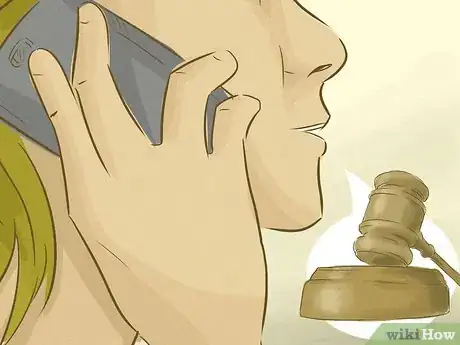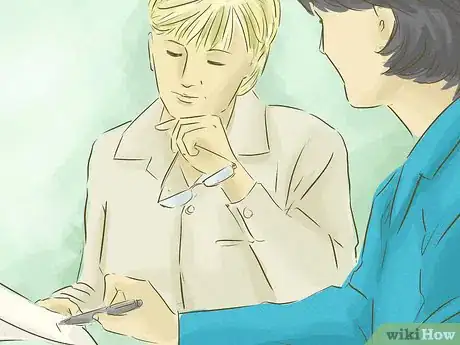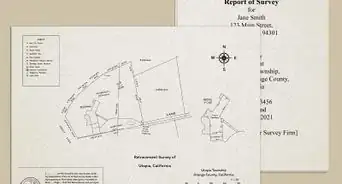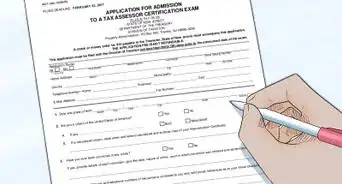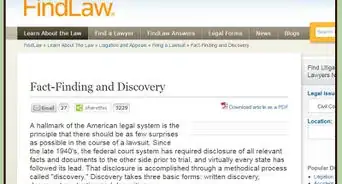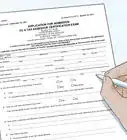This article was co-authored by Clinton M. Sandvick, JD, PhD. Clinton M. Sandvick worked as a civil litigator in California for over 7 years. He received his JD from the University of Wisconsin-Madison in 1998 and his PhD in American History from the University of Oregon in 2013.
This article has been viewed 73,500 times.
A real estate closing is often a nerve-wracking experience for both the buyer and seller. Typically, a large amount of money changes hands during closing and both parties to the transaction have done a lot of work leading up to the closing date. Plus, real estate contracts tend to be full of legal jargon that can be difficult for the average person to understand. However, if you have selected the right attorney to assist you with the real estate transaction, he or she can help relieve the stress of the closing by ensuring that all of your documents are prepared correctly and ready to sign, the deed has been drafted, and all the necessary paperwork is in order. Selecting the right real estate attorney will go a long way to ensuring that your home buying or selling process is a smooth one.
Steps
Choosing Potential Real Estate Attorneys
-
1Start searching for a real estate attorney early. Start searching for a real estate attorney at the same time you start searching for a new home. You need time to find a good real estate attorney, otherwise at the last moment, you will have to pick one without any research.
-
2Select an attorney with whom you already have a relationship. If you have previously used a real estate attorney to help you with a real estate transaction and had a positive experience with that attorney, don’t hesitate hire him or her again. Since you have already worked with this attorney before, you will have a good idea of the quality of the legal work and understand the attorney’s process for handling your real estate closing. Plus, the attorney may be willing to negotiate a lower fee since you are a repeat customer.
- If you have not hired a real estate attorney in the past, but you have used an attorney to help with another legal matter, such as drafting a will, ask that attorney if he or she does real estate law, as well. Many lawyers have a general law practice, meaning that they handle many different types of cases. Real estate law tends to be one area of the law that many general practice attorneys frequently handle.
Advertisement -
3Contact the bar association in your state. The bar association will be able to provide you with a list of attorneys in your area that specialize in real estate law. Using the state bar as a resource has the added benefit of ensuring that the attorney you choose is properly licensed to practice law in your location. You typically can either call the bar association or visit their website to find such a list of attorneys.[1]
-
4Ask for a recommendation from friends, family members, or colleagues. Almost everyone who buys or sells a house will hire a real estate attorney to represent him or her at some point during the transaction. Ask people you know that have bought or sold real estate whether they would recommend the attorney that they hired. You can even ask your real estate agent for a recommendation. Personal recommendations are a good tool to use when selecting an attorney, because they give you an opportunity to understand how the attorney handled your friend or family member’s particular case.[2]
- Since you can ask your friends and family the reasons why they either recommend or do not recommend the attorney they used, these recommendations may be more reliable than those from other sources.
-
5Examine lawyer review websites. Many resources exist online that allow clients to provide reviews of attorneys whom they have hired to represent them in different types of legal matters. By reviewing other individuals’ experiences with a particular attorney, you can judge whether an attorney might be the right fit for you. For an example of a popular lawyer review site, click here.
- Keep in mind that online reviews may not tell the whole story. If an individual is angry about the outcome of his or her case, for instance, he or she may not totally explain the circumstances, but may simply blame the outcome on the attorney.
-
6Search online for local real estate lawyers. Do a simple google search or a search on a website like lawyers.com to find attorneys in your area who handle real estate cases. This will help ensure that you choose an attorney who actually practices in the area of real estate law.[3]
-
7Determine whether your state allows attorneys to become certified in real estate law. Some states, such as the state of Texas, permit attorneys to specialize in a certain area of law by completing advanced training in that area of practice. Check with your state bar association to see if attorneys in your state can become certified in real estate law. If so, consider choosing an attorney who is certified in real estate law, as he or she will have extra training and experience that specially qualifies him or her to handle all aspects of real estate transactions.
Evaluating Real Estate Attorneys
-
1Schedule a consultation with a few attorneys. Many attorneys offer free initial consultations, so schedule appointments with those attorneys whom your friends, family members, or colleagues recommended. When you go to these appointments, your main goal is to get a sense of the attorney’s experience in handling real estate transactions. You also will want to judge whether the attorney is someone with whom you would feel comfortable working.
- Be sure to ask important questions, such as how much the attorney’s fees will be and whether the attorney will personally be handling your case, or another lawyer in the law firm. If so, ask if you will have the chance to meet with him or her regarding your real estate transaction.
- Keep in mind that at your initial consultation, you will probably not receive specific legal advice about your real estate transaction, but will be given an idea of the steps that the attorney will take in order to handle your real estate transaction.
-
2Ensure that each real estate attorney is certified to practice law and is in good standing. Check with your state bar association for resources to determine which attorneys are in good standing, as opposed to those whose law licenses have been suspended or are subject to disciplinary proceedings. Each state typically has a searchable database of all lawyers in the state from which you can determine their status.[4]
-
3Clarify each attorney’s fee structure. After meeting with each attorney, you should have a clear idea as to how much the attorney charges and a good estimate of how much it will cost you to have the attorney represent you in your case. This should be clear regardless as to whether the attorney bills by the hour or charges a flat fee. It is also important to know the amount of any retainer that you must pay in order to hire the attorney. While unexpected costs and problems certainly can arise in your case, an experienced real estate attorney will be able to give you a fairly clear picture of the type of fees that you will be facing.[5]
-
4Clarify who will actually work on your case. Sometimes attorneys hand over the initial work to junior attorneys or someone else who knows the law. During your consultation, ask who will work on your case and whether you are comfortable with that person or not.
- Pay attention to small things before you make your preference. How do attorneys treat you? Are they in hurry while talking to you? How long do they take to call you back? How approachable are they?
- Once you have hired an attorney, check the "retainer agreement" or "engagement letter" carefully to fully understand the terms and services the attorney will provide.
Hiring Your Real Estate Attorney
-
1Retain a real estate attorney. Once you find an attorney who fits your real estate closing needs, hire the attorney. At this point, you will either need to pay the attorney the agreed-upon price, as many real estate transactions are priced at a flat fee, or pay the attorney a retainer, which is a set amount of money necessary to hire the attorney. As he or she does work on your real estate transaction, the attorney will deduct his or her hourly fees from your retainer.
-
2Provide your attorney with all documents related to your real estate transaction. This step will allow your attorney to become familiar with your legal matter and ask any necessary questions before a real estate closing occurs. This process also allows the attorney to identify any problems or issues that he or she sees with your real estate transaction before reaching the point of closing.
-
3Cooperate with your lawyer. It is your lawyer’s job to give you legal advice about your legal matter. That is the reason that you are paying him or her to represent you in a real estate closing. As a result, you should cooperate with your lawyer and take his or her advice for the best possible outcome in your case.
References
- ↑ http://hirealawyer.findlaw.com/choosing-the-right-lawyer/where-to-find-a-lawyer.html
- ↑ http://hirealawyer.findlaw.com/choosing-the-right-lawyer/where-to-find-a-lawyer.html
- ↑ https://www.lawyers.com/commercial-real-estate/find-law-firms-by-location/
- ↑ http://hirealawyer.findlaw.com/choosing-the-right-lawyer/researching-attorney-discipline.html
- ↑ http://hirealawyer.findlaw.com/choosing-the-right-lawyer/what-should-i-look-for-when-trying-to-choose-a-lawyer.html
About This Article
Hiring a real estate attorney for a closing will help the process go a lot smoother. Before you select an attorney, visit your state’s bar association website and search for the list of attorneys that specialize in real estate. Cross-reference these names with lawyer review websites to find the right fit for you. It’s also helpful to ask friends and family for recommendations. It’s likely someone you know has a real estate attorney they would recommend. Once you narrow it down, you’ll want to schedule a consultation with at least a couple of different attorneys. You should ask to see their credentials and ask about their fees. To learn how to organize the documents you need for the real estate transaction, read on!
